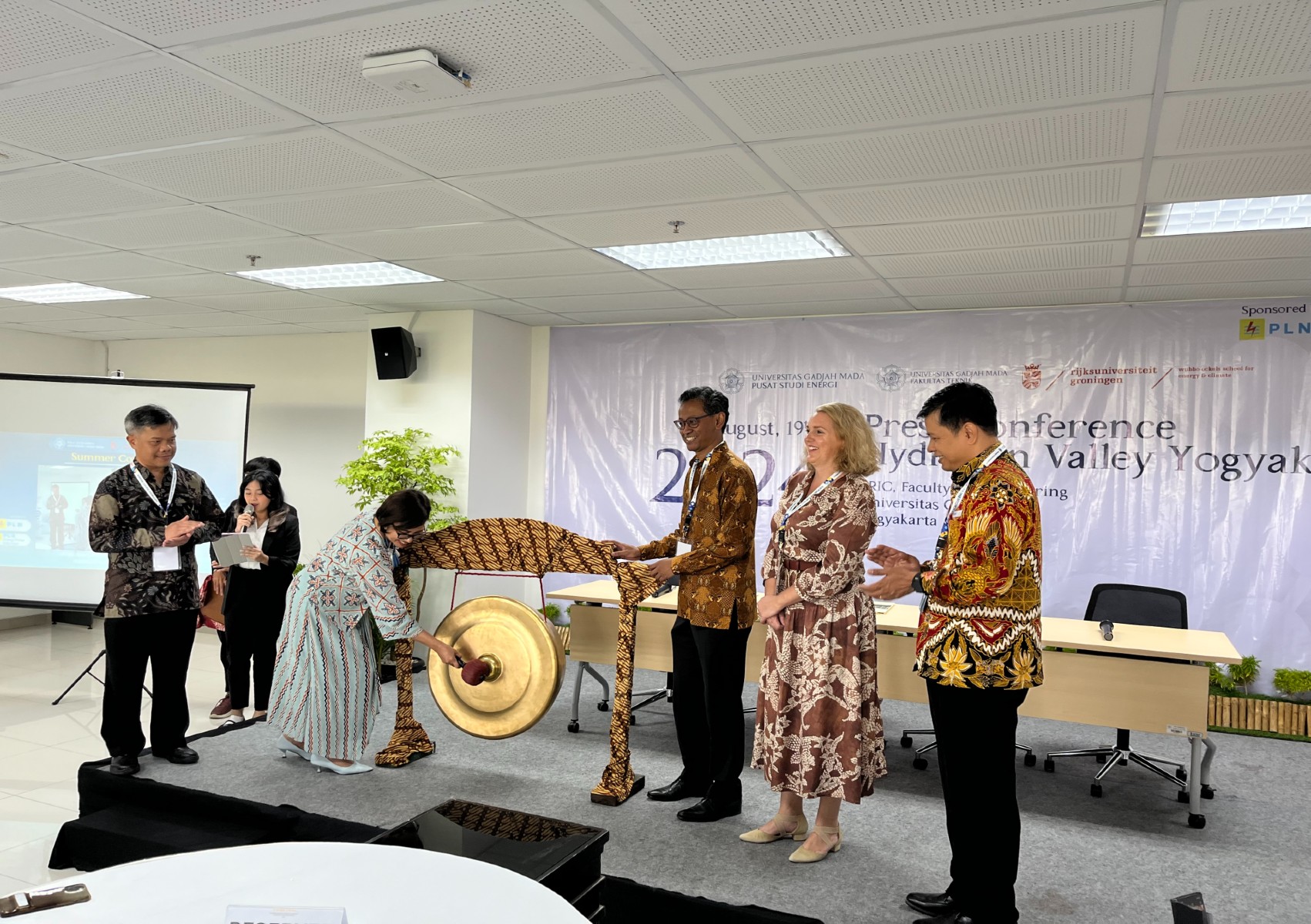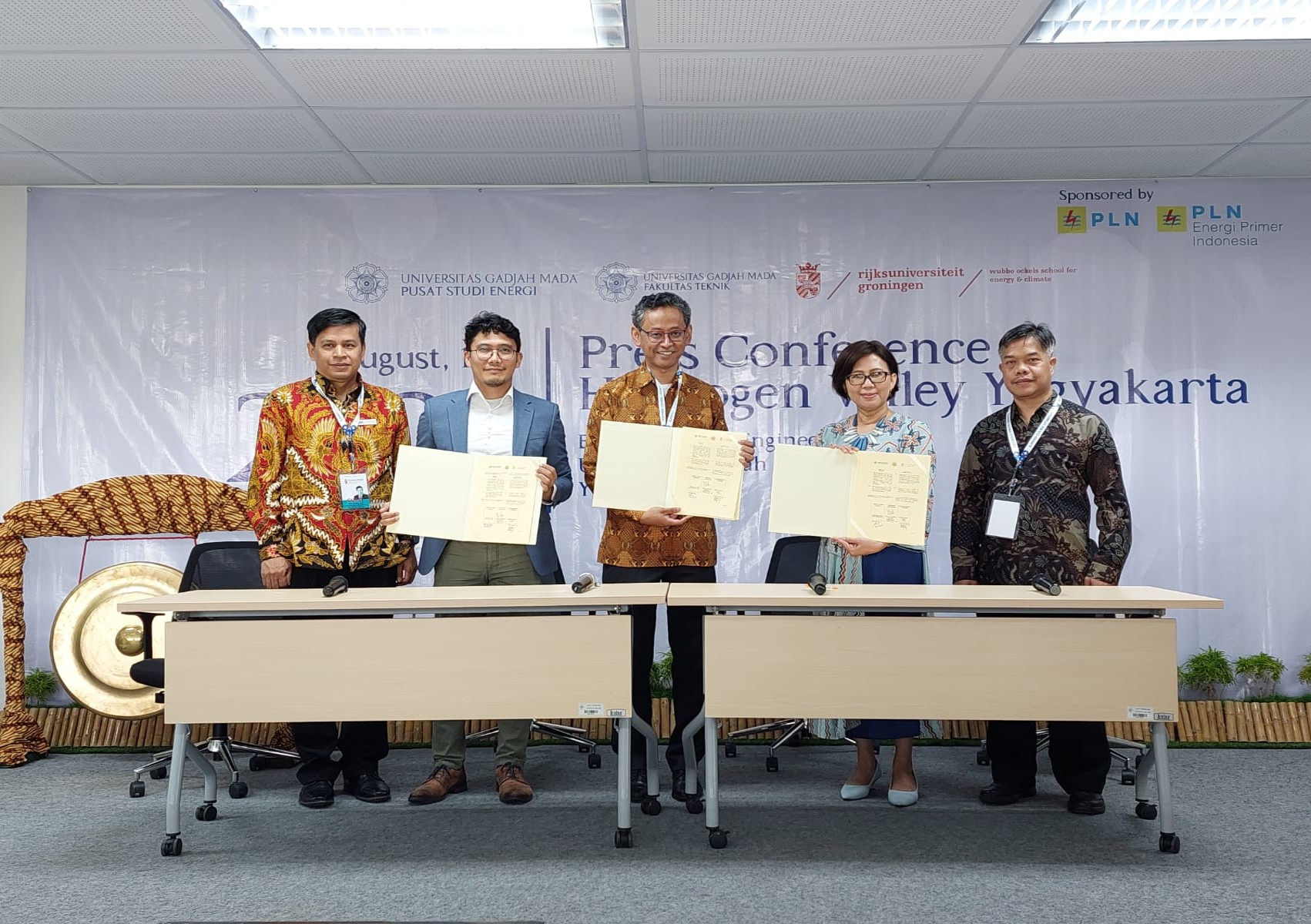Joint Groningen-Gadjah Mada Hydrogen Energy Summer School begins in Yogyakarta

In Yogyakarta this week, the University of Groningen (UG) and Universitas Gadjah Mada (UGM) launched a new initiative, the hub for Future Human Welfare , with a joint summer school held on campus at UGM. The summer school, entitled “Hydrogen's Role in Energy Transition: Perspective and Challenges”, is organized in connection with the Wubbo Ockels School for Energy and Climate . It brings together important stakeholders in Indonesia, including energy sector professionals as well as students and staff from UGM, to look into how hydrogen might play a role in energy transition in Indonesia.
Hydrogen summer school and energy transition in Indonesia
Indonesia is the fourth largest country in the world in terms of population, and therefore a major player in the global energy transition. As one of the world’s largest archipelagos, consisting of more than 18,000 islands, hydrogen energy could play a role for example in shipping, but also in transport and renewable energy storage. Experts and leading academicians from the Netherlands’ European Hydrogen Valley can play a collaborative role with Indonesian partners to address these issues. The summer school forms the starting point of a long-term collaboration on hydrogen.
Held on campus at Universitas Gadjah Mada, Yogyakarta, in UGM’s new engineering building, the summer school consists of lectures from experts in the field at both partners. From Groningen, Prof Paolo Pescarmona and Prof Michele Cucuzzella from the UG’s Engineering and Technology Institute (ENTEG), and Prof Aravind Vellayani from the Energy and Sustainability Research Institute Groningen (ESRIG) were in attendance. Leading the delegation was Prof Bayu Jayawardhana, Scientific Director of ENTEG and one of the university’s academic ambassadors for southeast Asia. From UGM, experts from the Faculty of Engineering will also take part in the summer school.
Also present at the launch of the summer school was Yvonne Klerks, the Education and Science attaché of the Embassy of the Kingdom of the Netherlands in Jakarta. Yvonne said:
“International collaboration on higher education and science is important to be able to address global challenges such as climate change. It is wonderful that the University of Groningen and UGM collaborate through this summer course on renewable energy with a focus on hydrogen. Without skilled students the energy transition in Indonesia and the Netherlands will not be possible. This summer school is an excellent initiative in the knowledge-to-knowledge collaboration on renewable energy and perfectly complements the work of the Embassy of the Kingdom of the Netherlands under the MoU with Indonesia.”
Over the next two days, industry professionals and researchers from UGM will discover the huge potential that hydrogen has in the energy transition. On Wednesday, Thursday and Friday, more students will join to learn about specific areas of research and technological innovations in the field. Throughout the summer school, students and staff of UGM will work closely with the UG colleagues present in Yogyakarta, developing closer bonds between researchers at both institutions. We hope that the connections made here will also lead to UGM researchers choosing to pursue a PhD either at UG or jointly between UGM and UG.
Cooperation UGM-UG-ECADIN
During the opening ceremony of the summer school, the Rector of Universitas Gadjah Mada, Prof Ova Emilia, was also present, demonstrating the strategic importance of this initiative to UGM. As part of the ceremony, an Memorandum of Understanding (MoU) was signed between the UG, UGM, and the Energy Academy Indonesia (ECADIN). The MoU underpins future collaborative work between the three parties, aiming to provide the necessary support for Indonesia to set up its own hydrogen valley.
UG-UGM hub: Future Human Welfare
The summer school forms the first activity in the UG-UGM hub for Future Human Welfare, a joint initiative bringing together researchers from across the academic spectrum at both UG and UGM. Drawing on the two partners’ long history of collaboration, the hub focuses joint research efforts into areas of mutual strategic interest, namely:
-
Liveable Cities
-
Adaptive Natural Resources Management
-
Sustainable Entrepreneurship
-
Equitable Global Health
-
Accelerated Energy Transition
Many of the above areas are closely linked with the UG’s four Schools for Science and Society, as well as the wider research priorities of both institutions, which specifically aim to co-create solutions to these global challenges.
More information
For more information, please contact:
-
Karen Voskamp, Institute Manager at ENTEG
-
Liza ten Velde, Policy Adviser Internationalization, Faculty of Science and Engineering
-
John Falvey, International Policy Advisor (Oceania and Southeast Asia), International Strategy and Relations

| Last modified: | 22 August 2024 1.23 p.m. |
More news
-
10 June 2024
Swarming around a skyscraper
Every two weeks, UG Makers puts the spotlight on a researcher who has created something tangible, ranging from homemade measuring equipment for academic research to small or larger products that can change our daily lives. That is how UG...
-
21 May 2024
Results of 2024 University elections
The votes have been counted and the results of the University elections are in!
